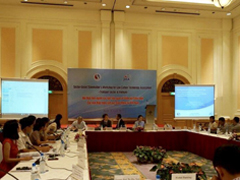- Home
- Technical Cooperation Projects
- Index of Countries
- Asia
- Viet Nam
- Project to Support the Planning and Implementation of NAMAs in a MRV Manner (SPI-NAMA)
- Project Activities
- Output 1 National Level Activities and Measures (from Year 2015 to present)
- Low-carbon Technology Assessment
- Summary of Transport Sectoral dialogue on low-carbon technology
Project Activities
Summary of Transport Sectoral dialogue on low-carbon technology
 Participants discussing during the workshop
Participants discussing during the workshop
Hanoi, 6th June 2017, under the framework of the "Low carbon technology assessment", the Ministry of Natural Resources and Environment, Viet Nam and the Japan International Cooperation Agency (JICA) co-organized the "Sector-based stakeholders' workshop for low carbon technology assessment" for the transport sector. The workshop had the participation of Vietnamese experts and specialists from ministries and organizations, corporations, and international experts.
For Transport sector, key discussion points can be summarized as follows:
| On-going activities |
|
| List of proposed low carbon measures in line with NDC |
|
| Areas of discussion |
|
| Technology assessment criteria |
|
The next steps will be:
- To discuss the feasibility of application of the proposed technologies in the context of Viet Nam, taking into consideration of barriers in policies and technical aspects.
- To elaborate on the technology and action assessment criteria for prioritization and its application in Viet Nam.
The "Low Carbon Technology Assessment" was jointly launched by the Department of Climate Change (MONRE) and JICA under the "Project to Support the Planning and Implementation of NAMAs in a MRV Manner (SPI-NAMA)" supported by JICA, with the main purpose of conducting technical assessment of mitigation measures for achieving the GHG emission reduction targets set out in the Nationally Determined Contributions (NDC) submitted by the Government of Viet Nam to the United Nations Framework Convention on Climate Change (UNFCCC).
- About JICA
- News & Features
- Countries & Regions
- Our Work
- Thematic Issues
- Types of Assistance
- Partnerships with Other Development Partners
- Climate Change / Environmental and Social Considerations
- Evaluations
- Compliance and Anti-corruption
- Science and Technology Cooperation on Global Issues
- Research
- JICA Development Studies Program / JICA Chair
- Support for the Acceptance of Foreign HRs / Multicultural and Inclusive Community
- Publications
- Investor Relations
